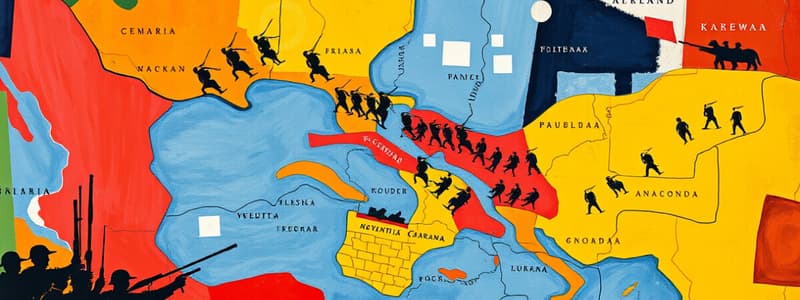Podcast
Questions and Answers
What was the Anaconda Plan?
What was the Anaconda Plan?
- Surround the South by sea to cut off its trade
- Capture Richmond, Virginia
- Split the Confederacy into sections
- All of the above (correct)
What year did the First Battle of Bull Run occur?
What year did the First Battle of Bull Run occur?
1861
What was significant about the Battle of Antietam?
What was significant about the Battle of Antietam?
It was claimed as a Union victory but seen as a defeat for both armies.
What was the outcome of the Battle of Gettysburg?
What was the outcome of the Battle of Gettysburg?
What was the Siege at Vicksburg?
What was the Siege at Vicksburg?
The war did not expand women's roles in society.
The war did not expand women's roles in society.
Who was known as the 'Angel of the Battlefields'?
Who was known as the 'Angel of the Battlefields'?
What was Abraham Lincoln's primary motivation for preserving the Union?
What was Abraham Lincoln's primary motivation for preserving the Union?
Who was the commanding general of the Union Army?
Who was the commanding general of the Union Army?
Who surrendered to General Ulysses S. Grant at Appomattox Court House?
Who surrendered to General Ulysses S. Grant at Appomattox Court House?
Who was the President of the Confederacy?
Who was the President of the Confederacy?
Flashcards are hidden until you start studying
Study Notes
Anaconda Plan
- Strategy devised by President Lincoln and General Winfield Scott to defeat the Confederacy.
- Aimed to surround the South by sea to restrict trade and resources.
- Intended to divide the Confederacy into regions to limit support and reinforcements.
- Goal to capture Richmond, Virginia, the Confederate capital, to dismantle its government.
First Battle Of Bull Run
- Occurred on July 21, 1861, marking the first major battle of the Civil War.
- Union forces initially expected a quick victory; civilians attended to watch.
- The battle shifted as Confederate General Thomas Jackson's troops held their ground.
- Resulted in a Confederate victory, boosting Southern morale and shocking the North about the war’s complexity.
Battle of Antietam
- Fought on September 22, 1862, in Maryland, which remained a Union state but had slave interests.
- General Robert E. Lee aimed to gain support from Maryland and impress European nations.
- Union General George McClellan claimed victory, yet the battle was seen as a draw by many.
- Key moment in the war, influencing future military and diplomatic strategies.
Battle of Gettysburg
- Took place from July 1-3, 1863, serving as a major turning point in the Civil War.
- Marked the end of Lee's second invasion of the North, resulting in a decisive Union victory.
- Known as the "High Water Mark of the Rebellion," it was the bloodiest battle of the war.
- Inspired Abraham Lincoln's "Gettysburg Address," reinforcing the fight for Union and equality.
Siege at Vicksburg
- Conducted from May 18 to July 4, 1863; Vicksburg was the last major Confederate stronghold on the Mississippi River.
- Its capture fulfilled the second phase of the Anaconda Plan.
- A combination of military strategies led to the siege, eventually forcing Confederate surrender.
War Expanded Women's Role in Society
- Prior to the war, women had limited roles and could not serve as nurses, teachers, or business owners.
- The Civil War necessitated women's involvement in various roles, paving the way for changes in societal norms.
Women Nurses
- Nurses traveled with troops, providing essential support such as food and supplies.
- Responsibilities included writing letters for soldiers, caring for the sick and wounded, cleaning wounds, and assisting surgeons.
Harriet Tubman
- Multifaceted role as a nurse, spy, and cook during the Civil War.
- Known for her work in the Underground Railroad aiding escaped slaves.
Clara Barton
- Excelled as a clerk before serving as a battlefield nurse.
- Earned the nickname "Angel of the Battlefields" for her dedication.
- Inspired to establish the American Red Cross after her experiences.
Abraham Lincoln
- Self-educated with little formal schooling; trained to be a lawyer later in life.
- Elected president in 1860 without support from Southern states.
- Chose to fight against secession to preserve the Union, irrespective of personal slavery beliefs.
- Encountered challenges in finding effective commanders during the war.
Ulysses S. Grant
- Served as the Commanding General of the Union Army.
- Central figure in leading Union forces to victory.
Robert E. Lee
- Commanding General of the Confederate Army.
- Notable for military leadership during the Civil War for the South.
Jefferson Davis
- Served as the President of the Confederacy.
- Key political leader during the Southern states' struggle for independence.
Appomattox Court House
- Site of General Robert E. Lee's surrender to General Ulysses S. Grant in April 1865.
- Marked the conclusion of the Civil War after four years of conflict.
Studying That Suits You
Use AI to generate personalized quizzes and flashcards to suit your learning preferences.




